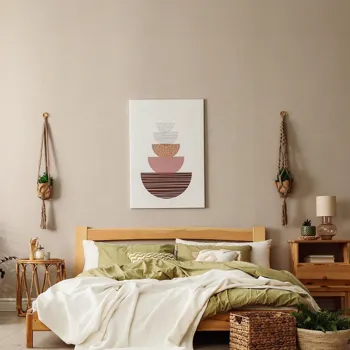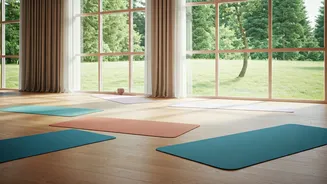Discover the power of routine in wellness. Learn 7 strategies for success and transform your daily life. Read more!
In the hustle and bustle of modern Indian life, where demands pull us in every direction
like kites in a monsoon wind, it's easy to lose sight of something remarkably simple yet profoundly impactful: routine.

We often hear about the latest superfoods or fitness fads, but establishing a regular daily routine might actually be the most powerful tool in your wellness arsenal.
A well-structured routine isn't just about scheduling tasks; it's about creating a framework that supports your physical, mental, and emotional well-being.
Think of it as the scaffolding that holds everything together, allowing you to navigate the day with greater intention, less stress, and a heightened sense of control.
When life throws its unpredictable curveballs, which it inevitably will, a solid routine acts as an anchor, preventing you from drifting too far off course.
So, why is routine so vital for wellness? The answer boils down to the human body's inherent need for predictability.
Our bodies thrive on rhythm. From the circadian rhythm that governs our sleep-wake cycle to the intricate hormonal fluctuations regulating mood and energy levels, our systems are constantly seeking patterns.
When we introduce a consistent routine, we're essentially working in harmony with our natural biology, rather than fighting against it. This synchronicity translates into a multitude of benefits.
A regular sleep schedule, for example, promotes better sleep quality, which in turn improves cognitive function, boosts immunity, and reduces the risk of chronic diseases.
Similarly, consistent mealtimes help regulate blood sugar levels, preventing energy crashes and maintaining a stable mood throughout the day.
Okay, we've established the "why," so let's dive into the "how." Crafting a wellness-supporting routine doesn't have to be a daunting task.
It's about making small, sustainable changes that gradually integrate into your daily life. Start by identifying areas where you feel most disorganized or stressed. Is it your morning routine, where you scramble to get ready and often skip breakfast?
Or perhaps it's your evenings, which are filled with mindless scrolling and late-night snacking? Once you've pinpointed these areas, you can begin to implement targeted strategies to create more structure and predictability. Remember, the key is to be realistic and flexible.
Don't try to overhaul your entire life overnight. Instead, focus on making one or two small changes at a time, and gradually build from there.
Here are seven strategies to help you weave a wellness-boosting routine into your daily life:
Rise and Shine with Intention
Avoid hitting the snooze button repeatedly. Aim for consistent wake-up and bedtime, even on weekends. This strengthens your circadian rhythm and improves sleep quality.

Start your day with a calming activity, such as meditation, yoga, or simply enjoying a cup of chai while reflecting on your goals for the day. This sets a positive tone and reduces the likelihood of feeling overwhelmed by the tasks ahead. Avoid checking your phone first thing in the morning.
Give yourself time to wake up fully and mentally prepare for the day.
Nourish Your Body Regularly
Schedule regular mealtimes, even if you're not feeling particularly hungry. This helps regulate blood sugar levels and prevents overeating later. Plan what you want to eat so that you can choose nutritious food that is easy to prepare and can be cooked quickly. Instead of relying on takeaways.
Pack healthy snacks to avoid impulsive unhealthy choices when hunger strikes between meals. Stay hydrated by drinking plenty of water throughout the day. Carry a water bottle with you and refill it regularly as a visual reminder.
Move Your Body Every Day
Incorporate physical activity into your daily routine, even if it's just for 30 minutes. This could be a brisk walk, a yoga session, a dance class, or a workout at the gym. The time duration doesn't matter, it helps with the blood flow.
Find an activity you enjoy, so you're more likely to stick with it. Schedule your exercise like any other important appointment and treat it as non-negotiable. If you are unable to take up some heavy cardio, that is alright. Try going for a brisk walk.
This will keep the blood circulation going and relax your mind.
Mindful Breaks for Enhanced Focus
Take regular breaks throughout the day to avoid burnout and maintain focus. Get up from your desk every hour to stretch, walk around, or simply look away from your screen. Practice mindful breathing or meditation to calm your mind and reduce stress.

Use your breaks to connect with colleagues or loved ones, fostering social connection and a sense of belonging. Avoid scrolling through social media during breaks, as this can be counterproductive.
Digital Detox to Unplug and Recharge
Set boundaries around your use of digital devices, especially in the evenings. Avoid using your phone or computer for at least an hour before bed. Designate specific times for checking emails and social media, and avoid constant notifications.

Take regular "digital detox" breaks to disconnect from technology and reconnect with yourself and your surroundings. Focus on activities that help you relax and unwind, such as reading a book, taking a bath, or spending time in nature.
Cultivate a Gratitude Practice
Make time each day to reflect on the things you're grateful for. This could be as simple as writing down three things you appreciate in a gratitude journal or expressing your appreciation to someone you care about.

Practicing gratitude shifts your focus from what you lack to what you have, promoting feelings of happiness and contentment. It also helps you build resilience and cope with challenges more effectively.
Incorporate gratitude into your daily routine by expressing thanks to others, noticing the beauty around you, and appreciating the small joys of life.
Prioritize Sleep for Optimal Restoration
Establish a consistent bedtime routine to signal to your body that it's time to rest. This could include taking a warm bath, reading a book, or listening to calming music. Create a sleep-conducive environment by ensuring your bedroom is dark, quiet, and cool.

Avoid caffeine and alcohol before bed, as these can interfere with sleep quality. If you have difficulty falling asleep, try meditation or deep breathing exercises to calm your mind. Aim for 7-8 hours of quality sleep each night to allow your body to rest, repair, and rejuvenate.
Remember, building a routine is a journey, not a destination. Be patient with yourself, celebrate small successes, and don't be afraid to adjust your routine as your needs and circumstances change. By incorporating these strategies into your daily life, you can create a powerful foundation for lasting wellness and thrive in the face of life's inevitable challenges. You will start to experience an increase in energy, a reduction in stress, and an overall improvement in your well-being. So, take the first step today and start building a routine that supports your unique needs and aspirations.
The beauty of a well-structured routine lies in its ability to create space for spontaneity and joy. When you have a solid framework in place, you're less likely to feel stressed and overwhelmed, which allows you to be more present and engaged in the moment.
You'll have more time and energy to pursue your passions, spend time with loved ones, and explore new experiences. A routine is, paradoxically perhaps, a source of freedom, not confinement. It frees you from the tyranny of the urgent and allows you to focus on what truly matters.
It gives you the time and space to truly live your life.
Finally, it's important to remember that your routine is personal and unique to you. What works for one person may not work for another. The key is to experiment and find what best supports your individual needs and preferences.
Don't be afraid to tweak and adjust your routine as you learn more about yourself and your body. The most important thing is to create a routine that is sustainable and enjoyable, so you can stick with it in the long run.
Think of your routine as a living document that evolves with you as you grow and change.
AI Generated Content. Glance/InMobi shall have no liability for the content


















